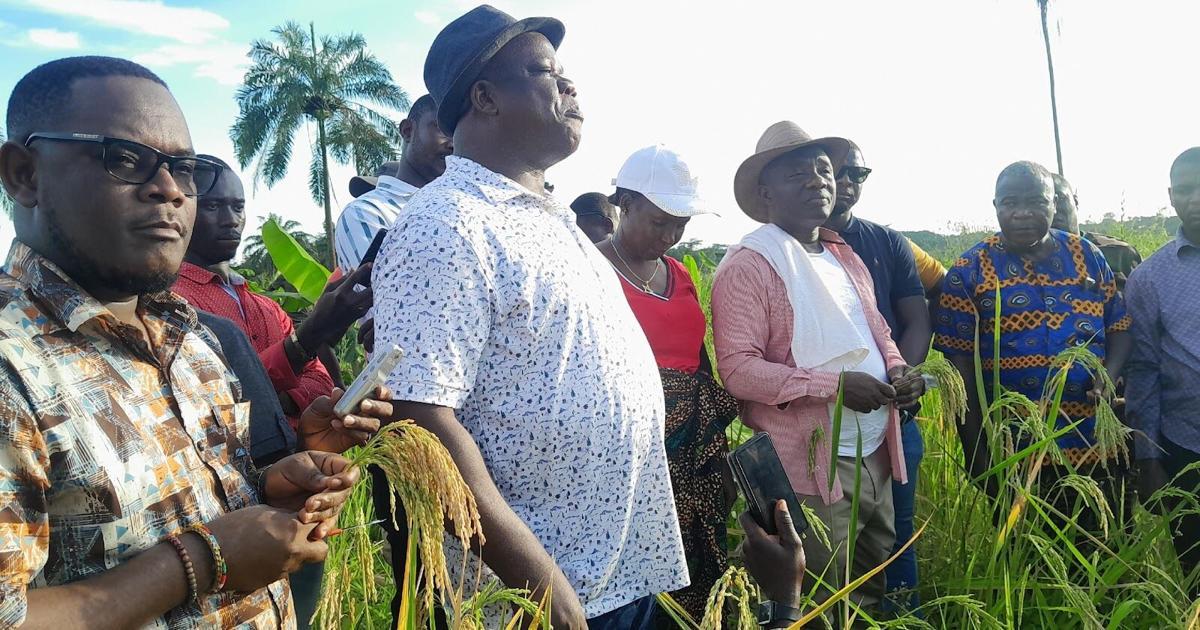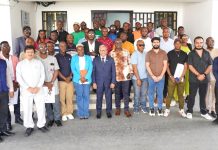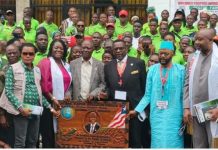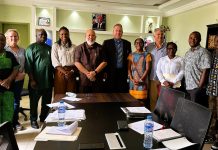Africa-Press – Liberia. As part of contributing to food sufficiency in Liberia, Bong County Senator Prince K. Moye has begun harvesting rice from his Kollie -Ta-Wolah farm in the county. The lawmaker has in recent years cultivated several hectares of farmland in his home county with rice and other farm crops.
The Senator told journalists that rice produced from his farms will be bagged and sold for a reasonable price on the local market.
The lawmaker has cultivated 75 hectares of upland with rice in Kollie Ta- Wolah in Jorquelleh District #2 with the employment of several youths and women on a long and short term basis.
“We as leaders need to begin taking steps in making our country food sufficient. When public officials adopt these steps, it will greatly help the agriculture sector,” Senator Moye said.
He believes the harvesting of the farmland rice will help reduce the dependence on the country on imported rice and reduce its price particularly in Bong County.
Senator Moye told journalists that yield from his rice farm would be placed on the market for consumption as his way of contributing towards food security of Liberia.
The Bong County Senator is among few Liberian politicians that own farms that aim to alleviate hunger and reduce rice importation in Liberia.
Christopher Sankolo, Director General of the Liberia Agricultural Commodity Regulatory Authority (LACRA) heaped praises on the lawmaker, describing him as a farsighted and development-oriented leader of Bong County.
The LACRA Director General said the lawmaker’s action is worthy of commendation particularly at a time when the government is struggling to make Liberia food secure.
“Senator Moye has proven to be a national leader as demonstrated by his actions. “I would like to appreciate him for his intervention as former National Campaigning Chairman of the Unity Party. This is welcoming.”
Sankolo said these are initiatives that demonstrate love for the country, adding “We hope that others will emulate what you are doing as we strive to make Liberia a food secure nation.”
The Director General of the Liberia Agricultural Commodity Regulatory Authority (LACRA) at the same time encouraged Senator Prince K. Moye to do intercropping, especially with cocoa and coffee.
He encouraged Liberian farmers to get involved within the cocoa and coffee sector by investing in the sector.
The 2021 Global Hunger Index classifies Liberia’s level of hunger as ‘serious. Liberia ranked 110 of 116 countries on hunger conditions. To better characterize conditions and guide urgent and long-term responses, the Liberian Ministry of Agriculture (MOA) is undertaking a Rapid Food Security, Livelihoods, Markets and Nutrition Assessment with the support of the U.N., USAID, and other donors.
KEY DRIVERS OF FOOD INSECURITY IN LIBERIA
Low local agricultural productivity – Limited availability of agricultural inputs, mechanized equipment, financial capital, and extension services are all serious challenges.
Highly dependent on imported staples (especially rice) – Seventy percent of rice consumed in Liberia is imported making the Liberian table vulnerable to global market price shocks
Limited nutritional diversity of local production – Local markets for high nutritional value products are underdeveloped due to constraints on both the supply and demand sides.
Extreme poverty prevents Liberians from meeting basic food needs – More than 50% of Liberians live below the poverty line ($1.90/day) and are unable to access sufficient food on a daily basis.
Liberia is a target country under the U.S. Government’s (USG) Feed the Future (FTF) Initiative aimed at ending global hunger and malnutrition and building sustainable, resilient food systems. USAID’s interventions are designed to meet USG objectives and directly address the drivers of food insecurity.
USAID’s anticipated five-year (2022-2027), ~$20 million Food Security, Nutrition, and Resilience (FSNR) activity will work with smallholder farmers in rural agricultural communities to increase agricultural productivity and build household and community resilience. FSNR will emphasize crop diversification to increase production and marketing of higher value and nutritious foods.
There have been calls for international donors that in order to reduce huge rice importation, Liberians should begin local food production. The country currently spends more than 400 million United States Dollars on food importation due to the lack of local production.
For More News And Analysis About Liberia Follow Africa-Press






